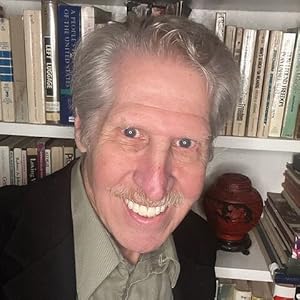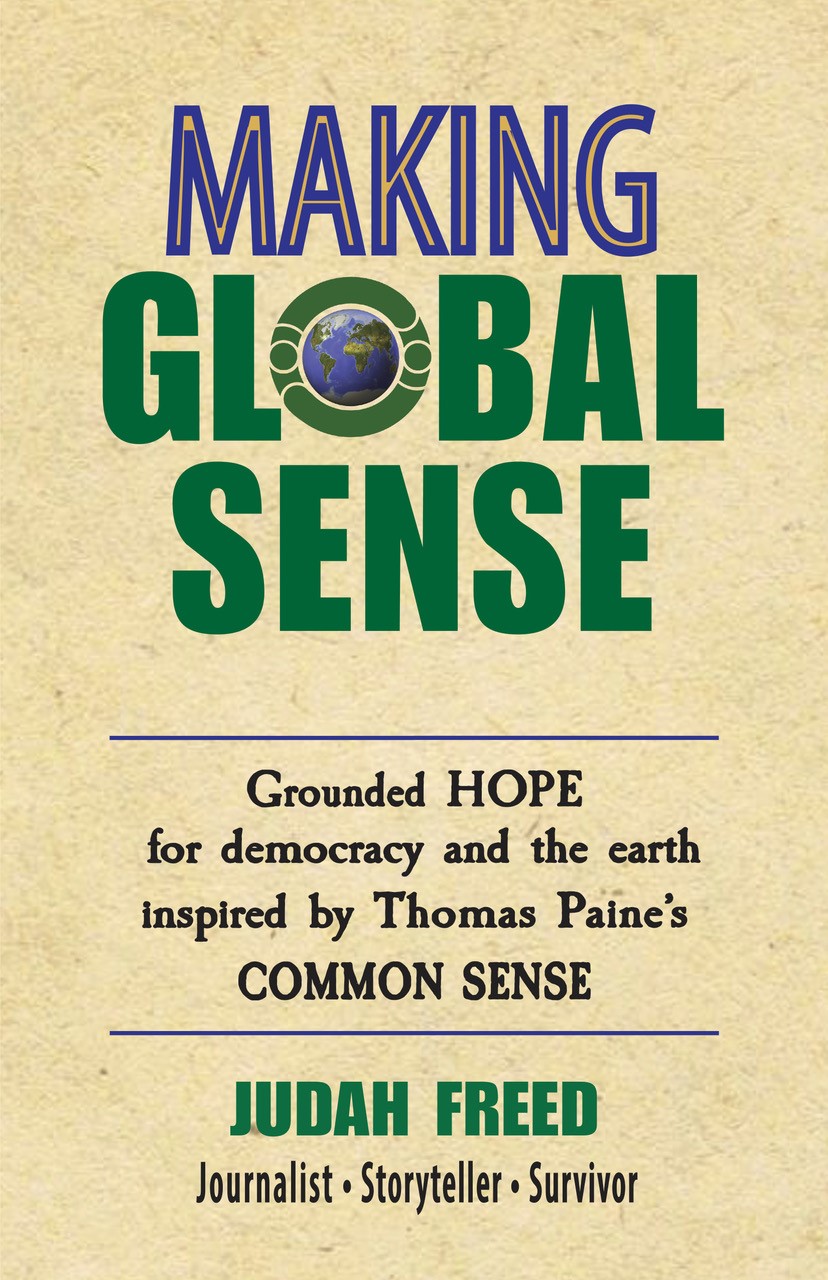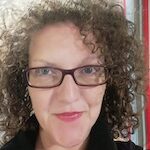Judah Freed is a seasoned journalist and award-winning author of “Making Global Sense: Grounded hope for democracy and the earth inspired by Thomas Paine’s Common Sense.”

Freed has won three Nautilus Book Awards, a Benjamin Franklin Book Award, an Eric Hoffer Book Award, and was nominated for the Dayton Literary Peace Prize. He’s also an educator, speaker, and indie publishing consultant. Freed serves on the ASJA First Amendment and Banned Books committee and represents ASJA on the steering committee of the Banned Books Week Coalition.
He worked a decade for Denver and Colorado newspapers and magazines, followed by two decades writing for media industry trade magazines, where he pioneered coverage of the emergent internet, interactive TV, and distance learning. His writings about media social effects, privacy rights, deep media literacy, and network democracy drew calls to speak on four continents. Returning home to Colorado in 2020 after a decade in Hawaii, he now works for a national news service.
In an email interview, Freed shared his experiences of combining activism with journalism. He also shares how his experience with cancer propelled his latest book. His responses have been edited for clarity and length.
What led you to a career in journalism and how did you get your start?
Growing up in 1950s Denver, I discovered early how words open worlds in my mind. My first love in school was creative writing. I found my voice in the Story Workshop at Columbia College Chicago, and I pictured the life of a storyteller, an essayist, a poet, or a literary novelist. Life flowed a different way.
I returned to Denver in the summer of 1976. That autumn, a family friend referred me for an internship at The Aurora Sun, a weekly newspaper. I resisted, not seeing myself as a journalist. A friend said I’d never know what I can do unless I try. Within a year, I was the lead reporter and a double columnist. A good start in journalism has sustained me through nearly 50 years of work. For the rest of the 1970s through the 1980s, I worked for newspapers and magazines in the Denver region. In the early 1990s, after more schooling, I did a career reset. I began writing for the top media industry trade magazines in the USA and Europe.
Love led me to a New Yorker living on Kauai and a decade editing newspapers and magazines in Hawaii. Coming home to Denver in 2020, I now pay the bills by covering Colorado civil courts for a national news service. My soulwork is writing award-winning nonfiction and fiction indie books.
What led you to focus on media literacy, privacy, and related First Amendment issues?
I’ve faced press freedom issues since I began in journalism. When I’d break regional front-page stories on government misconduct, I met stiff opposition, such as the outcry from exposing corruption in the regional agency regulating hospitals. I learned to value open records and open meetings laws. Transparency sheds light to dispel shadows.
When I began writing for media trades, I covered interactive media innovations and trends through the digital revolution. I also specialized in conversations with industry visionaries discussing “media-social effects.” We discussed data privacy rights, intellectual rights, freedom of expression, and the media’s social responsibility.
I became concerned about the invisible censorship within journalism. I noticed publishers protecting advertisers by limiting editorial coverage. For instance, I was almost hired as editor of a national wireless trade magazine until I mentioned possibly covering research on the effects on humans of non-thermal microwave radiation from cellular towers The job offer vanished! Years later, when I edited newspapers on Kauai, I learned the taboo against investigative reporting about island tourism, hospitality, military, and agrochemical GMO interests.
For me, genuine press freedom extends in all directions.
Was your book Making Global Sense a natural extension of your journalism?
In “Making Global Sense,” I revive ideas and ideals from Thomas Paine to champion 21st-century enlightenment. In these trying times of rapid climate change, as autocracy threatens democracy, I’m blending journalism, essay, and memoir to update Common Sense by Paine. Where Paine invited independence and revolution, I invite interdependence and evolution.

“Making Global Sense” grew out of my work in media journalism along with my decades as a peace and environmental activist. My activism informed my thinking when I began writing about interactive media. I advocated deep media literacy and network democracy. I advised that we should democratize internet governance, and I questioned the morality of private interests shaping the internet rules that will affect billions. Imagine if we vote on how the internet operates, on issues that affect us, like personal data privacy, spam control, net neutrality, or the ground rules for AI (before it gets uncontrollable). I’d like to live in that world.
After the 9/11 attacks, initially in response to the loss of civil rights and liberties under the Patriot Act, I adapted Paine’s Common Sense to produce a book called Global Sense. That had periodic (print-on-demand) update editions through 2012.
Surviving cancer in 2016 produced profound shifts in my thinking. I chose to completely rewrite my book. As I awoke from my second surgery, I asked myself, is there anything I need to do before I go? In that moment, I pictured the cover of my new book and knew I had to finish it.
Now at the end of 2024, I’ve published a third edition of “Making Global Sense.” I’ve updated the text to keep pace with world events and events in my own life. As sung in the Monty Python musical, Spamalot, “I ain’t dead yet.”
Were there unexpected challenges to writing a book?
Unlike writing for news publications with hard deadlines, writing a book for oneself is not bound by any deadline. This inner freedom differs from writing books under contract with deliverable dates, which carries the same pressure as writing an assigned article, but the timeframe is longer with books. My biggest challenge has been setting the book aside to do my day job, plus other public service, let alone time devoted to health care.
Tell us about ASJA’s First Amendment and Banned Book committee.
Originally two committees, they have merged into one. We sign on to various initiatives with a range of organizations, including petitions and letters going to public officials, local to national, as well as joining amicus briefs on related court cases. We vote as a committee to propose or endorse vital positions for the ASJA board to consider. The committee also participates with other organizations, such as my service on the national steering committee for the Banned Books Week Coalition. Further, we staged a Banned Books Week booth at the 2024 ASJA virtual annual conference.
How can ASJA members support First Amendment rights and fight book bans?
Write about First Amendment and book-banning issues in your local community, state, and region. Assertively fact-check false or misleading stories and narratives by the opponents of press freedoms. Cover public events where restrictive policies are considered, such as (meetings of) the school board, library board, county board, city or town council. Participate in local initiatives that protect our freedom to report facts, and the freedom to read and think freely. Advocate full transparency for open meetings and open records. Don’t accept evasive responses to direct questions of public officials. Get officials on the record and report their lies and evasions as part of the public record. In short, be a great journalist.
Further, educate yourself about book banning and challenges to the First Amendment. For instance, watch the video interview I recorded for the ASJA conference with mind control expert Steven Hassan PhD talking about the closed mindset that favors book banning.
Fiona Young-Brown is an author, fact-checker, and editor of ASJA Confidential based in Lexington, KY. She is currently working on her first novel and a book about obscure Lexington.
Browse Articles
Topic
Advocacy, ASJA, Book Publishing, Freelance Life, Journalism

